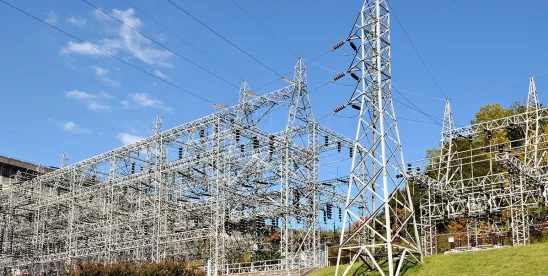On Wednesday, the Senate Energy and Natural Resources Committee passed the “Energy Infrastructure Act” by a vote of 13-7, with Senators Steve Daines (R-MT), Lisa Murkowski (R-AK), and Bill Cassidy (R-LA) voting with Committee Democrats in favor of the bill. Forty-eight bipartisan amendments were incorporated into the bill during markup, with most being adopted en bloc by voice vote at the start of the meeting.
Sponsored by Chairman Joe Manchin (D-WV), the Energy Infrastructure Act represents the Committee’s intended contribution to the infrastructure deal currently being negotiated by a bipartisan group of Senators and the White House. It would authorize $73 billion for power-related infrastructure and nearly $100 billion overall. Senate negotiators are currently working to draft legislative text for other components of the bipartisan infrastructure framework, and the Energy Infrastructure Act is a candidate to be included in the package along with bipartisan infrastructure and surface transportation legislation developed by other Senate committees of jurisdiction.
Look Ahead
On Thursday, Senate Majority Leader Chuck Schumer (D-NY) announced that he intends to file cloture on the entire infrastructure package, which is still in development, on Monday. This would potentially tee up the package for Senate passage as soon as the end of next week. Leader Schumer had previously informed the Senate that it would work into the scheduled August recess to pass an infrastructure bill, if necessary. House Speaker Nancy Pelosi (D-CA) has also said that the House would take up the bill if the Senate is able to pass it next week.
In addition to the bipartisan infrastructure negotiations, Senate Democrats are working on a parallel track to finalize a budget resolution that would allow for $3.5 trillion in spending over the next decade through budget reconciliation. The deal is expected to include elements of President Biden’s American Families Plan and American Jobs Plan that are not included in the bipartisan infrastructure deal, including energy and climate-related programs. Congressional Democrats are likely to proceed with a reconciliation package regardless of the outcome of infrastructure negotiations.
Below is an overview of key provisions included in the Energy Infrastructure Act as reported by the Senate Energy and Natural Resources Committee.
Grid Infrastructure and Resiliency
Transmission & Wildfires. The Act contains several provisions in Title I that would authorize funding to improve grid resiliency, harden the grid to the threat of wildfires, build out non-federal electric power transmission lines, and improve the siting and planning of interregional transmission.
Smart Grids. The bill would promote the deployment of smart grid functions and facilities by authorizing $3 billion in funding for the Smart Grid Investment Matching Grant Program for FY 2022-26.
Cyber Security. The bill contains several provisions specific to electric sector cybersecurity. It would authorize an energy sector cybersecurity RD&D program, establish an Energy Cyber Sense program to test cybersecurity of products and technologies intended for use in the Bulk Power System, and establish a grant and technical assistance program at the Department of Energy (DOE) to deploy advanced cyber technologies at utilities not regulated by the Federal Energy Regulatory Commission (FERC). It would also direct FERC to issue a rulemaking on rate incentives for advanced cybersecurity technology.
Clean Energy Supply Chains
Mineral Security. The bill would establish and authorize funding for a national geologic mapping program to comprehensively identify domestic surface and subsurface mineral resources. It also authorizes funding for energy and mineral resources research at the U.S. Geological Survey and authorizes a new facility to demonstrate the feasibility of a full-scale integrated rare earth element concentrator and refinery.
Electric Vehicle Battery Programs. Consistent with Democrats’ support of vehicle electrification, the Energy Infrastructure Act would establish within DOE a Battery Material Processing Grant program and a Battery Manufacturing and Recycling Grant program, as well as authorize additional funds for the existing lithium-ion battery recycling prize competition. It would also establish an RD&D program to study second life applications, final recycling, and disposal of batteries that power electric drive vehicles.
Carbon Capture, Utilization & Storage
The Energy Infrastructure Act includes substantial funding authorization support for carbon capture, utilization, and storage (CCUS) infrastructure.
The bill includes S. 799, the “Storing CO2 and Lowering Emissions (SCALE) Act,” which authorizes new programs and funding for high-capacity carbon dioxide transport and storage infrastructure and has bipartisan support. It also authorizes funding for Class VI well permitting activities at the Environmental Protection Agency (EPA), allows the Department of the Interior (DOI) to allow for leases, easements, or rights-of-way for carbon dioxide storage activities in the Outer Continental Shelf, and authorizes $3.5 billion for the creation of four regional direct air capture (DAC) “hubs.”
Hydrogen
Research and Development. The bill would authorize new research, development, and deployment activities for clean hydrogen production, transport, storage, and utilization at DOE, and provides a definition of “clean” hydrogen based on carbon intensity of hydrogen production that would apply to hydrogen produced from renewables, fossil fuels with CCUS, biomass, and nuclear energy.
Funding for Hydrogen Hubs. The bill would also authorize $8 billion for the creation of four regional hydrogen hubs that demonstrate the production, processing, delivery, storage, and end-use of clean hydrogen from all applicable energy resources.
Nuclear Energy
Reports to Congress. The bill requires DOE to submit a report to Congress on how the Department intends to enhance national energy resilience through the use of micro nuclear reactors (less than 50 megawatts production capacity). It would also require DOE to create a civilian nuclear credit program that would provide financial assistance to qualifying nuclear facilities to sustain production for four years.
Hydropower
Promoting Hydropower. The legislation would authorize additional funding for existing hydroelectric production and efficiency incentives and would authorize funding for a pumped storage hydropower project to facilitate long-duration storage of intermittent renewable electricity.
Energy Efficiency and Buildings
Building Efficiency. The bill would establish a competitive grant program to enable sustained cost-effective implementation of updated building energy codes and provide grants to institutions of higher education to establish training and assessment centers to promote energy efficiency and environmental performance in buildings. For industrial energy efficiency, it would also authorize funding to provide grants to promote industrial research and assessment centers and authorize the Secretary to provide financial assistance to states to establish programs to implement smart manufacturing technologies.
Weatherization Funds. The bill would authorize $3.5 billion for the existing weatherization assistance program, authorize additional funding for the existing energy efficiency and conservation block grant program, for energy conservation technologies grants for federal facilities, and for the extended product rebate system at DOE. It would also require DOE to establish an Energy Jobs Council.
Methane Reduction
Federal Lands. The bill would require DOI to establish a program, in conjunction with DOE, to plug, remediate, and reclaim orphaned wells on federal lands. As part of this program, DOI and DOE would identify and monitor idled wells (those that have not operated for at least 4 years) and eventually plug, remediate, and reclaim such wells.
Natural Resources and Water Infrastructure
Wildfire and Extreme Weather Events. The bill would authorize $3.5 billion to the Departments of the Interior and Agriculture for a comprehensive and wide-ranging program to reduce the risk of wildfires on federal lands and lands held in trust by the federal government for Tribes.
Mined Lands. The bill would authorize $2 billion for ecosystem restoration, including invasive species on non-federal land and mitigate environmental hazards on non-federal mined lands
Forest Service Legacy Road and Trail Remediation Program. The bill would authorize $250 million for a Forest Service Legacy Road and Trail Remediation Program that would restore passages for fish and other aquatic species and decommission unauthorized user created roads and trails.
Water. The bill would create a new program at DOI to provide federal assistance for groundwater recharge, aquifer storage, and water source substitution projects.
The bill also authorizes appropriations for the following water infrastructure programs and projects:
-
$1.15 billion for water storage, groundwater storage, and conveyance projects;
-
$3.2 billion for the Aging Infrastructure Account;
-
$1 billion for rural water projects;
-
$1 billion for water recycling and reuse projects;
-
$250 million for water desalination projects and studies;
-
$500 million for the safety of dams program;
-
$400 million for WaterSMART grants;
-
$300 million to implement the Colorado River Basin Drought Contingency Plan;
-
$100 million to provide financial assistance for watershed management projects;
-
$250 million for design, study, and construction of aquatic ecosystem restoration and protection projects;
-
$100 million for multi-benefit projects to improve watershed health; and
-
$50 million for endangered species recovery and conservation programs in the Colorado River Basin.
Clean Energy Technology Demonstrations
The bill would authorize funding for clean energy demonstration projects for a variety of technologies as authorized in the Energy Act of 2020, which was included in the Omnibus Appropriations Act, 2021 signed into law at the end of last year. Technology demonstrations authorized under the bill include those for energy storage, advanced nuclear reactors, mineral security projects, CCUS, DAC, hydropower and marine energy, renewables, and industrial emissions. An amendment from Senator Bill Cassidy (R-LA) that was incorporated into the bill would also establish an Office of Clean Energy Demonstrations within DOE to conduct project management and oversight of demonstration projects authorized under the bill.
In addition, the bill would establish a new demonstration program to determine the technical and economic feasibility of clean energy demonstration projects on current and former mine land.
Wage Rate Requirements
Like other initiatives passed in the Senate under Majority Leader Schumer, the bill includes a provision requiring a prevailing wage for all laborers and mechanics working on projects assisted in whole or in part by funding under the Act.





 />i
/>i

